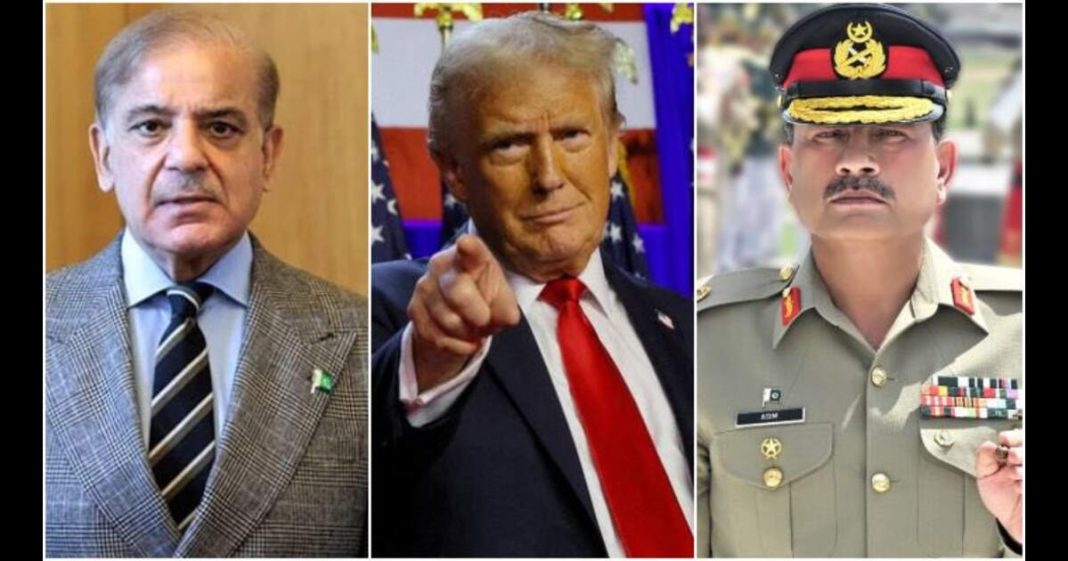Pakistan is preparing for a potential diplomatic breakthrough as Prime Minister Shehbaz Sharif is expected to meet U.S. President Donald Trump on September 25 during the UN General Assembly in New York. Reliable sources confirmed that the meeting will take place on the sidelines of the Assembly, with Pakistan’s Chief of Army Staff, Field Marshal Asim Munir, also likely to participate. Qatar and Saudi Arabia are reported to have extended their support for the high-level engagement, highlighting its regional significance.
#BREAKING PM Shehbaz may meet Trump on Sept 25, with FM Asim Munir. Backed by Qatar & Saudi Arabia. pic.twitter.com/RUKHq3KPN9
— Mansoor Ahmed Qureshi (@MansurQr) September 16, 2025
Reliable sources confirmed that the meeting will be held on the sidelines of the Assembly, with Pakistan’s Chief of Army Staff, Field Marshal Asim Munir, also likely to participate. The development is being closely watched as both Qatar and Saudi Arabia are reported to have extended their support for this high-level engagement.
The agenda is expected to cover a wide range of pressing issues
Diplomatic insiders indicate that discussions will focus on Pakistan’s devastating floods and the need for international support in reconstruction and relief efforts. The fallout from the recent Israeli strike on Qatar is also likely to be raised, reflecting Islamabad’s growing engagement in Middle Eastern affairs.
Another key topic will be Pakistan-India tensions, which have escalated since the armed confrontation earlier this year. Observers suggest that Trump may again seek to play a mediating role, having previously claimed credit for brokering a ceasefire between the two nuclear-armed rivals in May.
Economic and trade matters are also expected to feature
Pakistan and the U.S. recently signed a trade agreement aimed at reducing tariffs, expanding market access for Pakistani exports, and promoting cooperation in energy and critical minerals. Earlier this month, Pakistan secured a $500 million investment from U.S. Strategic Metals to develop its critical minerals sector, including plans for value-addition facilities and a poly-metallic refinery.
The meeting occurs amid broader shifts in U.S. South Asia policy. Since the early 2000s, the United States has actively sought to support India’s rise as a major power. During George W. Bush’s presidency, Washington struck a landmark deal endorsing India’s civilian nuclear program despite its controversial weapons development.
Under Obama, the focus expanded to defense industrial cooperation, enhancing India’s military capabilities and regional power projection. During Trump’s first term, the U.S. further elevated the partnership by sharing sensitive intelligence with India and including it in key strategic initiatives.
At the same time, Washington has grown increasingly disillusioned with Pakistan. Once a close ally during the Cold War, Islamabad is now often viewed as an unreliable partner in counterterrorism and is scrutinized for its deepening ties with China, which has become a major source of infrastructure investment and military equipment.
Successive U.S. administrations have framed India as a democratic counterweight to China, positioning New Delhi at the center of a broader Indo-Pacific strategy while Pakistan’s strategic alignment with Beijing complicates Washington-Islamabad relations.
The upcoming Sharif-Trump meeting, supported by Gulf allies and occurring against this complex backdrop, is being closely watched as a potential turning point in Pakistan-U.S. relations, with implications for trade, security, and regional diplomacy.
Read more: Trump sues The New York Times for defamation and libel, seeks $15 billion
The military dimension is equally significant
Army Chief Asim Munir has been at the center of Pakistan’s renewed engagement with Washington. In June, he held a rare one-on-one meeting with President Trump, signaling the importance both sides attach to military-to-military ties.
He returned to Washington in August to attend the retirement ceremony of CENTCOM Commander General Michael E. Kurilla and the change of command to Admiral Brad Cooper. During the visit, Munir also met U.S. Chairman of the Joint Chiefs of Staff General Dan Caine. These high-profile interactions suggest that defense and security cooperation will form an important part of the Sharif-Trump talks.
Despite the growing diplomatic momentum, Pakistan’s embassy in Washington has so far avoided confirming or denying whether the meeting will take place. Analysts say this caution reflects both the sensitivity of the discussions and Islamabad’s desire to avoid premature publicity. Still, the upcoming meeting—backed by Riyadh and Doha, and taking place against the backdrop of rising regional tensions—marks a steady warming of ties between Islamabad and Washington after years of drift and mistrust.














